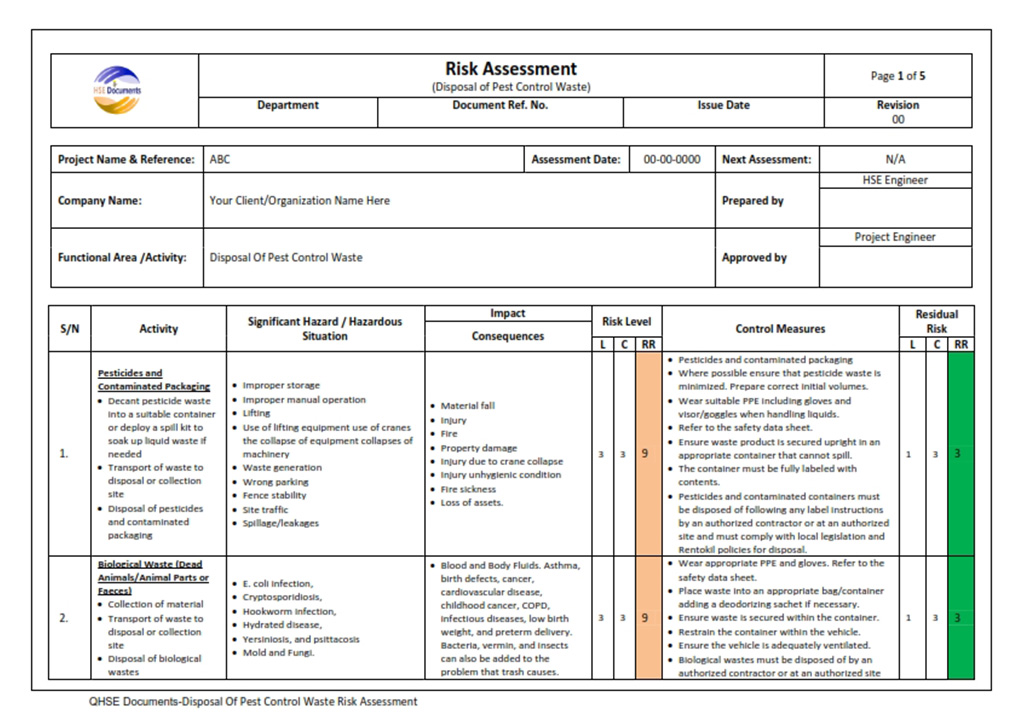This Free-Version Risk Assessment for "Disposal Of Pest Control Waste Risk Assessment" is uploaded by health and safety professionals via HSE Documents. Keep visiting the site frequently to download various accessible and editable safety and health documents.
Disposal of Pest Control Waste
Description in Sequence
All different waste streams must be segregated before disposal according to their type.
Pesticides and Contaminated Packaging
- Decant pesticide waste into a suitable container or deploy a spill kit to soak up liquid waste if needed
- Transport of waste to disposal or collection site
- Disposal of pesticides and contaminated packaging
Biological Waste (Dead Animals/Animal Parts or Faeces)
- Collection of material
- Transport of waste to disposal or collection site
- Disposal of biological wastes
UVA Tubes
- Storage and transport
- Disposal of UVA tubes
Batteries
- Storage and transport
- Disposal of batteries
WEEE (Waste Electrical and Electronic Equipment)
- Disposal of WEEE
Existing Risk Controls
- Pesticides and contaminated packaging
- Where possible ensure that pesticide waste is minimized. Prepare correct initial volumes.
- Wear suitable PPE including gloves and visor/goggles when handling liquids.
- Refer to the safety data sheet.
- Ensure waste product is secured upright in an appropriate container that cannot spill.
- The container must be fully labelled with contents.
- Pesticides and contaminated containers must be disposed of following any label instructions by an authorised contractor or at an authorised site and must comply with local legislation and Rentokil policies for disposal.
Biological Waste (Dead Animals/Animal Parts or Faeces)
- Wear appropriate PPE and gloves. Refer to the safety data sheet.
- Place waste into an appropriate bag/container adding a deodorizing sachet if necessary.
- Ensure waste is secured within the container.
- Restrain the container within the vehicle.
- Ensure the vehicle is adequately ventilated.
- Biological wastes must be disposed of by an authorised contractor or at an authorised site and must comply with local legislation and Rentokil policies for disposal.
- Contractors collecting waste must be informed of waste content before collection.
UVA Tubes
- Ensure tubes are stored and transported in an appropriate container.
- Wear suitable gloves when handling broken tubes. Where possible use shatterproof tubes.
- UVA tubes must be disposed of following any label instructions, by an authorised contractor or at an authorised site and must comply with local legislation and Rentokil policies for disposal.
- Wear eye protection.
Batteries
- Batteries must be stored segregated in a manner to prevent leakage of contents.
- If a residual charge is present, isolate battery terminals before disposal, e.g. with insulation tape, to prevent shorting.
- This should be secured and fully labelled during transport.
- Appropriate gloves and goggles must be worn if handling leaked batteries.
- Batteries must be disposed of following any label instructions by an authorised contractor or at an authorised site and must comply with local legislation and Rentokil policies for disposal.
WEEE (Waste Electrical and Electronic Equipment)
WEEE must be disposed of following any label instructions by an authorised contractor or at an authorised site and must comply with local legislation and Rentokil policies for disposal.







1.jpg)


No comments:
Post a Comment